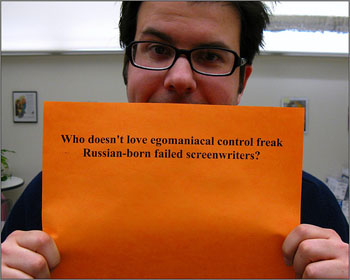When is a question not a question? Well, consider this little story:

Source: “A question,” TheeErin, Flickr
The teacher walked into the classroom late one morning, and several students were drawing pictures on the board. The teacher said, “When are you going to grow up?” One of the students said, “Maybe in a couple of years.”
Why did the student’s reply make the teacher angrier than she already was? Why did it seem like a smart-aleck thing to say?
The answer sounded disrespectful, stupid, or both because the teacher did not really expect an answer. She did not mean her question as a question. What she meant was “You should have grown up by now.”
A question that is not really a question is called a rhetorical question. You can use such questions to add power to your writing. Usually writers use rhetorical questions to ask readers to share their displeasure, disbelief, or disgust as in this example: “Is there anybody who likes to be ignored?” Sometimes they show readers their enthusiasm or interest, as in “Is there anybody who doesn’t like ice cream?” Sometimes rhetorical questions are used to make negative statements. For example, “how can you be so mean?” really implies “You are mean.” Sometimes they are used to make positive statements. The question “Why are you such a good friend to me?” essentially means “You are a good friend.”
All the questions in the next exercise are rhetorical questions, but some imply positive statements and some imply negative statements. Classify these rhetorical questions as positive or negative statements.
- How can you be so stupid?
- Have you ever seen anything prettier than this sunset?
- Were you raised in a barn or what?
- Did you get uglier as you got older or were you born that way?
- Could this weekend be any more perfect?
- Wouldn’t you like to just listen to this band forever?
- What kind of answer is that?
- What could be more important than our families?
Now see if you can choose a rhetorical question to complete each of the following short paragraphs.
The food in the cafeteria seems to be getting worse. Yesterday I got some milk that I’m pretty sure was going sour. Plus the salad greens always have brown spots in places. Not only that, but the French fries are always cold.
1. Which of the following would end the paragraph with a rhetorical question?

Source: “SMIC cafeteria,” Micah Sittig, Flickr
I walked into the remodeled cafeteria the other day to see what they had changed. I was really surprised at how great it looked. There are now big windows that overlook the playing fields and the tables are smaller, more like tables at a restaurant. Also the ceiling has been lowered, and the lighting has been softened so there is no glare of bright lights.
2. Which of the following would end the paragraph with a rhetorical question?
I talked to a woman who works in the cafeteria about the remodeling. She said that she was happy about the new look. But she said that there was still a problem with students leaving trash on the tables and even on the floors. She told me that when she was in school, students were more responsible.
3. Which of the following would end the paragraph with a rhetorical question?
Rhetorical questions pack emotion. They are like typing a text message in all caps. For this reason, they should be used sparingly to give your writing variety and power at just the right moment

Source: “SMIC cafeteria,” Micah Sittig, Flickr